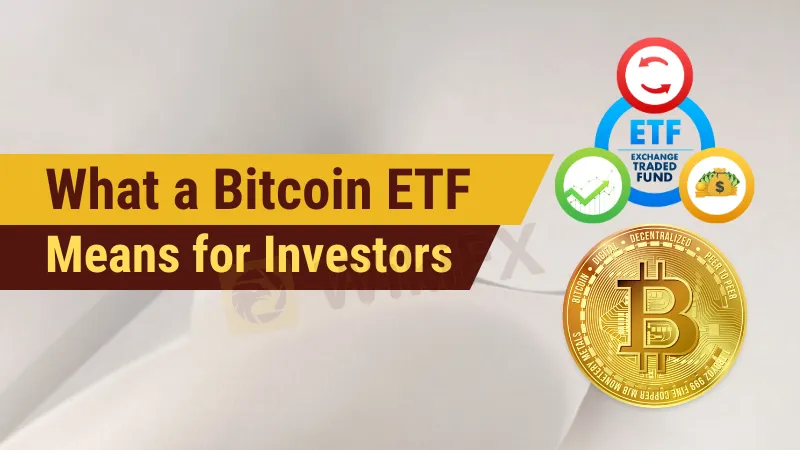简体中文
繁體中文
English
Pусский
日本語
ภาษาไทย
Tiếng Việt
Bahasa Indonesia
Español
हिन्दी
Filippiiniläinen
Français
Deutsch
Português
Türkçe
한국어
العربية
What a Bitcoin ETF Means for Investors
Abstract:SEC approves 10 bitcoin ETFs: BlackRock, Invesco, Fidelity, Grayscale, and Ark Invest among them. Discover the impact on investors and the crypto market.

In a significant development for the cryptocurrency market, the U.S. Securities and Exchange Commission (SEC) has approved the first-ever batch of spot Bitcoin Exchange-Traded Funds (ETFs) in the United States. This groundbreaking decision paves the way for 10 ETF sponsors, including industry giants like BlackRock, Invesco, Fidelity, Grayscale, and Ark Invest, to commence trading as early as this week.
Related news:
https://www.wikifx.com/en/newsdetail/202401118284826550.html
The approval, although expected, follows a brief hiccup when a false statement falsely claiming the regulator's endorsement of a Bitcoin ETF appeared on the SEC's compromised social media account. The agency promptly clarified the situation, reaffirming the authenticity of its
Wednesday approval.
Related news:
https://www.wikifx.com/en/newsdetail/202401101234132773.html
What Is a Bitcoin ETF?

An ETF, or Exchange-Traded Fund, is an investment vehicle that tracks the performance of an underlying asset, such as stocks, currencies, precious metals, or, in this instance, Bitcoin. Investors can gain exposure to the asset's value without owning it directly. ETFs trade on traditional stock exchanges and their value mirrors that of the underlying asset, rising when its price increases and falling when it declines.
A Historical Perspective
The approval of spot Bitcoin ETFs draws comparisons to the launch of the SPDR Gold Shares ETF, the first-ever spot gold ETF, in 2004. Before the gold ETF's introduction, the total market capitalization of gold ranged from $1 trillion to $2 trillion, expanding to an astonishing $16 trillion within a few years post-approval, as per Vijay Ayyar, Vice President of International Markets for CoinDCX.
Ayyar predicts that Bitcoin's adoption will experience even greater acceleration, particularly in 2024, as the approval of a spot Bitcoin ETF could pique the interest of retail investors who were previously hesitant.
Implications for Investors
The introduction of a Bitcoin ETF broadens the audience of potential Bitcoin buyers and sellers, particularly among those with limited cryptocurrency trading experience. Kevin de Patoul, Co-founder and CEO of Keyrock, emphasizes the profound impact of the ETF's approval on the cryptocurrency market.
“This ETF has two main impacts: increased distribution in the US and increased credibility of crypto as an 'asset class,'” de Patoul explained. He further added, “Bitcoin is no longer considered shady or infamous. This significantly changes the perception for the mainstream public.”

Additionally, Bitcoin's inclusion in mainstream investment portfolios becomes more feasible, enabling retail investors to access it more easily.
Institutional fund managers can incorporate it into their investment funds, while retirement planners can offer it in employer-sponsored 401(k) plans. This simplifies Bitcoin ownership, eliminating the need for hardware wallets and the complexities of storage.
Timo Lehes, Co-founder of Swarm Markets, stated, “The approval of a Bitcoin ETF has huge implications for US investors because they can now hold crypto in their brokerage account, which they couldn't do before. This gives the green light for portfolio diversification into the asset, and we expect major inflows of capital into the market as a result.”
In conclusion, the approval of spot Bitcoin ETFs marks a pivotal moment in the maturation of the crypto asset class, according to Ayyar. It provides retail investors with an easy, secure avenue to gain exposure through their brokerage accounts and offers a credible endorsement for large institutions and market participants seeking a more accessible way to engage with the asset class without direct crypto ownership's inherent risks.
Bottom Line
The SEC's approval of spot Bitcoin ETFs represents a significant milestone in the cryptocurrency world, opening up new investment opportunities for a broader range of investors, both retail and institutional. This development not only enhances the credibility of cryptocurrencies as a legitimate asset class but also streamlines access to Bitcoin, ushering in a new era of crypto investment in the United States.

Disclaimer:
The views in this article only represent the author's personal views, and do not constitute investment advice on this platform. This platform does not guarantee the accuracy, completeness and timeliness of the information in the article, and will not be liable for any loss caused by the use of or reliance on the information in the article.
Read more

Coinbase Under Scrutiny Amid Wrapped Bitcoin Delisting Controversy
Coinbase has come under fire after announcing its decision to delist Wrapped Bitcoin (wBTC), a move critics claim could be driven by competitive interests. The delisting, set to take effect on 19 December, has sparked allegations of market manipulation and concerns about fairness in the cryptocurrency ecosystem.

Solana Soars to All-Time High, Hits $264 on Coinbase
Solana hits $264 on Coinbase, breaking its 3-year high with an 11% daily surge. Learn what’s driving SOL's meteoric rise and the crypto market rally.

Mastercard Partners with JPMorgan for B2B Cross-Border Payments
Mastercard and JPMorgan's Kinexys Digital Payments join forces to enhance B2B cross-border payments, promising faster settlements and greater transparency.

Bitcoin Nears $100,000: A Triumph of Optimism or a Warning Sign?
Bitcoin’s meteoric rise continues to capture global attention as its price recently surpassed the $99,000 mark, briefly approaching the $100,000 milestone. This unprecedented rally has led market sentiment to reach a state of “extreme greed,” according to the Fear and Greed Index. Analysts suggest that the market may be entering overheated territory, raising questions about sustainability amidst ongoing enthusiasm.
WikiFX Broker
Latest News
Hackers Charged for $11M Crypto Theft Using SIM-Swaps
Role of Central Banks in the FX Market
FCA Alerts Against Sydney FX
What Makes Cross-Border Payments Easier Than Ever?
Trader Exposes Unethical Practices by STP Trading
Bitcoin Nears $100,000: A Triumph of Optimism or a Warning Sign?
Malaysian Man Loses RM113,000 in Foreign Currency Investment Scam
Mastercard Partners with JPMorgan for B2B Cross-Border Payments
FCA Identifies Clone Firm Exploiting Admiral Markets' Credibility
Coinbase Under Scrutiny Amid Wrapped Bitcoin Delisting Controversy
Currency Calculator


